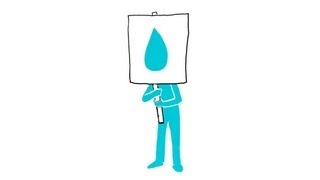(单词翻译:单击)
You might have heard that we're running out of fresh water.
你可能听说过我们要把淡水用光了的这个说法。
This might sound strange to you because,
这可能会让你觉得非常奇怪,
if you live in a place where water flows freely from the tap or shower at any time, it sure doesn't seem like a big deal.
因为你居住的地方水很自然地就从水龙头或喷头流出来,所以这件事看起来没什么大不了。
It's just there, right? Wrong!
水是唾手可得的,对吧?错啦!
The only obvious thing about fresh water is how much we need it.
一个有关淡水的最明显的问题就是:我们有多需要它。
Because it's essential to life, we need to think about it carefully.
因为生命离不开水,所以我们必须审慎地思考这个问题。
Right now, at this very moment, some people, women and girls in particular,
此时此刻,许多人--多数为女人或女孩子,
walk hours and miles per day to get fresh water, and even then, it may not be clean.
每天花数个小时、走好几里路去取淡水,即使如此,取得的水也不一定干净。
Every 15 seconds, a child dies due to water-born diseases. This is tragic!
每15秒钟就有一个儿童死于经水传播的疾病。太悲剧了!
The most compelling reasons to think about fresh water,
因此探讨淡水资源最迫切的原因
therefore, have to do with what we might call the global common good.
就是我们所谓的全球共同利益。
This is not something we normally think about,
它并不是我们平时所想的那个意思,
but it means recognizing how much fresh water matters for the flourishing of human and non-human life on Earth now and in the future.
而是不论何时,我们都应认清淡水对滋养地球上的人类和非人类的重要性。
How do we think about something as local as our faucets and as global as fresh water?
我们要如何思考日常生活中的水龙头和引起全球关注的淡水?
Is there a connection between them?
它们之间真的有所关联吗?
Many people assume that fresh water shortages are due to individual wastefulness:
许多人以为淡水资源短缺是因为个人的浪费:
running the water while you brush your teeth, for example, or taking really long showers.
比如刷牙时让水不停的流,或是淋浴时间太久。
Most of us assume, therefore, that water shortages can be fixed by improving our personal habits:
因此大多数人都做出假设,如果我们改变个人习惯,水资源缺乏就可以得到解决:
taking shorter showers or turning off the water while we brush our teeth.
比如缩短淋浴时间或是在刷牙时把水关掉。
But, global fresh water scarcity neither starts nor ends in your shower.
但是,全球淡水匮乏的问题和你淋浴的时间关系不大。
Globally, domestic use of fresh water accounts for only 8% of consumption, 8%!!
以全球角度而言,家庭用水只占了全部用量的8%。8%!!
Compare that to the 70% that goes to agriculture and the 22% that goes to industrial uses.
相比之下,有70%的水用于农业,22%的水用于工业。

Now, hold up - you're not off the hook!
不过,也别以为个人完全没有责任!
Individual habits are still part of the puzzle.
个人习惯也是造成这一问题的部分原因。
You should still cultivate water virtue in your daily life, turn off the tap when you brush your teeth.
你仍然要在日常生活中培养省水的美德,在你刷牙时关掉水龙头。
But still, it's true. Taking shorter showers won't solve global problems, which is too bad.
但是,有个不争的事实。缩短洗澡时间无法解决全球问题,这也是问题严重的地方。
It would be much more straightforward and easier if virtuous, individual actions could do the trick.
如果品德高尚的个人行为可以解决问题,那真是太直接、太简单了!
You'd just stand there for 30 seconds less, and you'd be done with that irksome, planet-saving task for the day.
你只要少冲30秒钟的澡,就算完成了这一天令人苦恼的、拯救世界的任务了。
Well, that's not so much the case.
嗯,事情并非如此。
Agricultural and industrial patterns of water use need serious attention.
农业和工业上对于水的使用,需要我们多加注意。
How do our societies value water? Distribute it?
我们的社会如何衡量水的价值?如何分配?
Subsidize its use in agriculture? Incentivize its consumption or pollution?
该补贴农业用水吗?该鼓励水资源的消耗或污染吗?
These are all questions that stem from how we think about fresh water's value.
这些问题都是起源于我们如何看待淡水资源的价值。
Is it an economic commodity? A human right? A public good?
水算是一种经济商品吗?还是一种人权?还是一种公众利益?
Nobel prize winners, global water justice activists, transnational institutions like the United Nations,
诺贝尔奖得主们、全球公平用水行动主义者、像是联合国一般的跨国组织,
and even the Catholic Church are at work on the issue.
乃至于天主教会,都在探讨这个问题。
But, it's tricky, too, because the business of water became very profitable in the 20th century.
但这依旧是个棘手的问题,因为与水相关的产业在二十世纪开始变得非常有利可图。
And profit is not the same thing as the common good.
而获利和公众利益并不是一回事。
We need to figure out how to value fresh water as a public good,
我们需要想清楚如何把淡水资源视为一种公众利益,
something that's vital for human and non-human life, now and in the future.
这对人类和非人类来说至关重要,无论是现在还是将来。
Now that's a virtuous, collective task that goes far beyond your shower.
比起你的洗澡水,这才是一个有道德的、集体的任务。


